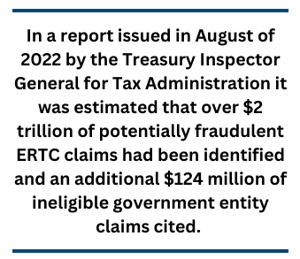Not so Fast…. Fraudulent ERTC Claims are in the IRS’ Crosshairs
 The Employee Retention Tax Credit (ERTC) has provided Federal Tax Credits to employers for periods during COVID-19 where they may have suffered from government shutdowns at the entity level, supply chain level issues, or a significant and detrimental revenue decline.
The Employee Retention Tax Credit (ERTC) has provided Federal Tax Credits to employers for periods during COVID-19 where they may have suffered from government shutdowns at the entity level, supply chain level issues, or a significant and detrimental revenue decline.
If you have applied and received an employee retention tax credit, particularly if you have depended on a payroll company or so-called “tax credit consulting firm” to help you apply for the credit (for a percentage of the credit secured), you may have subjected yourself to being charged with fraud by the IRS, and the consequences of having to deal with that fraud.
Are you in the IRS’ crosshairs?
ERTC Fraud and Scams: Can You Really Claim a Supply Chain Interruption for ERTC Purposes?
Initially, companies taking advantage of Paycheck Protection Program (PPP) loans were ineligible to also claim ERTC. Revised legislation reversed this and granted businesses the right to claim ERTC in any periods that PPP dollars were not used to cover payroll.
As with any guidance from the government that changes and morphs over its life, “updates” provided room for many tax credit companies and affiliated payroll processing companies to full-court press businesses by telling them that they absolutely qualify for credits even in many instances where they may not. The IRS is keenly aware of this potential abuse, and fraud that is running rampant as more and more claims are being submitted by these companies on behalf of businesses that do not even have a full understanding of what the qualifications are and if they meet them.
I am the first one to advocate for, and assist my clients in, accessing all government assistance to which they are entitled. I also work closely with them to review the qualifications for these credits to accurately arrive at a conclusion that is supportable for making a valid claim.
But many tax credit companies and payroll affiliates are contacting businesses directly and claiming that under the “partial suspension and supply chain interruption” section of the ERTC, they may qualify for the credit. Frankly, this is a gray area that has now opened up floodgates for suspicious and unqualified claims. For many businesses, this just isn’t the case – even though the supply chain shutdown parameters are being touted as a slam dunk, they really have some clearly defined criteria.
Unfortunately, quite a few businesses are relying on the supply chain loophole to claim a credit, even if they did not experience a government shutdown, fully funded the payroll during shutdown with PPP dollars or did not have an overall revenue decline.
If an actual supply chain disruption occurred, your business would need to be able to support that your supplier was shut down by government order, that they could not gain access through any other supplier for the required product, and that the disruption caused a revenue decline in “more than a nominal segment of the business operations.”
The IRS notice relative to this defines a “more than nominal” segment to mean more than 10% of total business gross receipts or 10% of payroll allocation of the total employee hours.
This is the area where the largest amount of potential abuse and fraud is being detected. The tax credit companies, while clearly stating they “cannot offer tax advice,” are calling and emailing businesses urging them to get on the bandwagon for this free ride without any responsibility of protecting them from future audits or reversal of fraudulent and unsupportable claims.
And Then, There’s the Other Low-Hanging Fruit... Aggregation Rules and Family Wages Related to ETRC Claims
Another area the IRS is likely to target for fraud is the Aggregation Rules and Family Wage exclusion that applies to claiming ERTC. It appears that many tax credit consultants may be ill-advising clients and subsequently processing ineligible claims for taxpayers in violation of these exclusions.
The aggregation guideline delineates that businesses with common ownership must be considered in aggregate when assessing qualification for a valid ERTC claim. Family or related individual wages specifically excluded from eligible wages for ERTC include relatives of majority entity owners; children or descendants of a child; brothers; sisters; stepbrother or sisters; step-parents; nieces; nephews; aunts; uncles; sons or daughters-in-law; fathers or mothers-in-law; and brothers or sisters-in-law.
In many cases, my clients have reached out to me after receiving a phone call from tax credit consultants or payroll companies soliciting businesses to process an ERTC claim on their behalf. My clients tell me they are not even being asked if they have family or relative wages, or any other commonly owned businesses. I have had to reach out directly to these “consultants” who have filed erroneous claims that included ineligible family-paid wages … even when and where they were specifically told upfront by my client to be respectful of the ineligibilities.
Here's a “real kicker”: one consulting firm tried to bill my client for the claim and the required amendment to the claim! It is clear to me that these tax credit agencies are not aware of the full set of guidelines, or just not “in the business” of making sure the taxpayers are aware of these considerations, or more likely, are only concerned with getting their fees for processing as many claims as possible.
I Am Fiercely Protective of My Clients, So …
I realize I am fiercely protective of my clients and want to ensure anything I advise them on is something they can rest assured I will support and prevail on if the IRS were to audit and decide to look at closely. I have had quite a few meetings with clients enchanted with hearing about these huge ERTC credit dollars that could be theirs “with minimal risk, minimal effort, and no out-of-pocket dollars.”
The process of educating them on Employee Retention Tax Credit qualifications can be disappointing when they are being hounded by soliciting processing companies telling them they can easily build a case for making the claims. I advise my clients to pull all the specific data and make sure under scrutiny they have all the appropriate documentation ready to support any claims submitted.
The filing and submission of these claims does not include the reasoning or basis the business is utilizing to substantiate the claim, so the IRS is blindly issuing refunds, but I promise you, they are laying the groundwork to begin auditing claims where they have information that business revenues, in fact, increased during any claim periods and large ERTC dollars have been issued.
In an August 2022 report by the Treasury Inspector General for Tax Administration, it was estimated that over $2 trillion of potentially fraudulent claims had been identified and an additional $124 million of ineligible government entity claims cited. These figures hit hard in our struggling economy and leave me wondering if everyone is aware that in the end, we, the taxpayers, are paying for these fraudulent claims.
If You Think You Have Submitted a “Suspicious” ERTC Claim
.png?width=255&height=237&name=FM%20Blog%20Graphics%20(2).png) In the event you have been convinced to file claims that may not be supportable, there are looming consequences that could be more severe than just paying the dollars back. At a minimum, interest and penalties will be assessed on any audited claims that result in a determination of fraud. Civil and criminal penalties could also be imposed depending on the facts, circumstances and dollar amounts involved.
In the event you have been convinced to file claims that may not be supportable, there are looming consequences that could be more severe than just paying the dollars back. At a minimum, interest and penalties will be assessed on any audited claims that result in a determination of fraud. Civil and criminal penalties could also be imposed depending on the facts, circumstances and dollar amounts involved.
There is speculation that the IRS may implement a voluntary disclosure program relative to the onslaught of taxpayers that have filed claims that may not qualify under the ERTC regulations. If this program is adopted, I advise any taxpayer that has made claims they are unsure about to review the qualifications in detail and participate in the program if they feel their claims were unsupported.
I never want to see taxpayers of integrity being coerced into making bad decisions to submit claims when they have not been expertly educated on the qualification criteria. I strongly urge every taxpayer to consult with their trusted tax professional if they are considering acting on making ERTC claims, especially when being courted by an outside agency to do so.
I am happy to consult with anyone that has questions about the validity of their submitted or potential ERTC claims. If you would like a review of your ERTC claim to make sure you are qualified and in compliance with the program, please contact me via email at jennifer.bean@freedmaxick.com.
